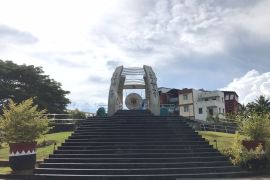However, this year, "mudik" turned into a tragedy for travelers trapped in over 30-kilometer-long queues of vehicles attempting to exit the East Brebes junction of the new Pejagan-East Brebes toll road, which was inaugurated by President Joko Widodo (Jokowi) on June 16, 2016.
Thousands of homebound travelers had to endure an up to 35-hour-long traffic jam while trying to get out of the Brebes toll exit, popularly called "Brexit," an abbreviation for the Brebes Exit.
The severe congestion occurring on the new toll road before and even after the Lebaran day that fell on July 6 was rather unexpected.
There were varying reports on how long the traffic jam lasted, ranging from 20 to 35 hours. Some drivers claimed that the queues to pay the toll further worsened the situation.
In response to the tragedy, President Jokowi had stated on July 4 that the completion of infrastructure development projects, particularly of toll roads, would be expedited to prevent the recurrence of congestion on the toll road segments of Pejagan-East Brebes in future.
Jokowi admitted that Pejagan-East Brebes was one of the toll road segments mostly used by homebound travelers during the end of the fasting month of Ramadhan.
"Although the gates in the middle of the toll road have been removed, (cars) still have to queue up. However, if the toll road connects the regions of Batang to Semarang, Semarang to Solo, Solo to Ngawi, and Ngawi to Kertosono, then the traffic will run smoothly (and there will be no more congestion)," the president noted.
The president further pointed out that the land clearance problems had, so far, been hindering the development of infrastructure projects.
Similar land clearance issues had also marred the development of the Trans-Java toll road, Jokowi explained.
"I always spoke about this (land clearance case), as it can hamper development for 20 years. I think this case must be solved. God willing, we will resolve it within the next two years," the president added.
The president also instructed the concerned ministries and institutions to make better preparations for a smooth and safe "mudik" next year.
Indonesia, which has the largest Muslim population in the world, celebrated the post-fasting month of Lebaran on July 6.
Of the countrys population reaching over 255 million, more than 85 percent are Muslims.
Several Muslims usually spend the Islamic holidays with relatives in their hometowns, triggering a massive exodus from cities.
The number of homebound travelers for Lebaran this year was estimated to reach over 17 million, including some four million, using various means of land transportation.
Several days before the holiday season, President Jokowi had reminded the relevant ministries and institutions to prevent traffic jams and improve public safety during the Lebaran exodus.
On July 12, the Indonesian Police had apologized to the road users trapped in Brexit.
"It was a major congestion. We extend our apology to the public for failing to meet their expectations. We, the apparatus and the government, have tried to deliver our best services," Brigadier General Agus Rianto, spokesman of the National Police, noted at the Police Headquarters.
Rianto, however, denied a report claiming that more than 10 people had died due to the prolonged congestion.
"Regarding information that several people had died due to the congestion on the toll road, actually, there were no casualties," he clarified.
However, several homebound travelers were treated in Brebes for various conditions that later led to their deaths, he explained.
Earlier, a report had stated that 12 road users had died due to the prolonged traffic jam.
Later, spokesman of the Health Ministry Oscar Primadi had clarified that the deaths occurred not within one day but between July 3 and 5 across several locations.
The police spokesman also informed the press that the number of traffic accidents, fatalities, and crimes on the roads during the holiday season had decreased.
Commenting on the Brexit tragedy, several NGOs believed that poor coordination among the relevant institutions had resulted in the traffic jams.
"Synergy among the stakeholders was very poor, and this led to unexpected congestion," Executive Director of Indonesia Network for Public Service Watch Paring Waluyo Utomo stated at a press conference in Jakarta on July 14.
Inter-institutional synergy should have been established, regardless of a regional border, he stated.
"Ideally, they should have reminded each other. The Public Works and Public Housing Ministry should have identified damaged and landslide-prone roads, and the police should have warned the transportation minister about roads having no direction signs," he pointed out.
Utomo said he could understand if the transportation minister did not feel guilty for the severe congestion, as traffic-related issues fall under the authority of the police, and repairing damaged roads is the responsibility of the public works and housing minister.
The NGO stressed that the government should also have the capacity to mitigate problems related to traffic jams.
A similar view was echoed by Anwar Ilmar, a researcher at the Berdikari Institute, who remarked that the police had failed to address major traffic jams due to a lack of synergy.
Anwar said the government should have mapped out alternative roads for the travelers.(*)
Reporter: Fardah
Editor: Heru Purwanto
Copyright © ANTARA 2016











